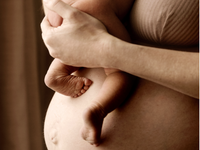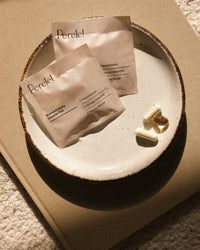By Angela Tafoya
Wandering around a new city, hours spent watching the waves, never cracking open your laptop—we all love vacation. But along with the OOO bliss, it’s not uncommon to experience some ups and downs along the way, especially if you’re venturing off to a far-flung destination and putting your body through multiple time zones and external stressors.
You could be in the most picturesque setting but once that hormone-induced jetlag kicks in, the only thing that sounds satisfying is lying horizontal in your own bed. Symptoms like slowed digestion, sleep disturbances, and even delayed menstrual cycles can all be the result of disrupted hormones when traveling—definitely not as fun as sipping that poolside cocktail.
Many of us have likely experienced these shifts while on the road or abroad, and understanding them can help make it all a little more tolerable. To make better sense of what really happens to your hormones when traveling, we’re breaking it down below.
How does traveling affect your hormones?
Hormonal fluctuations while traveling are a direct result of the changes you’re experiencing in sleep, diet, and environment. If you’re crossing multiple time zones, your sleep is probably going to be impacted—and sleep disturbances are a major agitator when it comes to hormonal production and regulation.
Your body’s ability to produce melatonin, which is the hormone that regulates your sleep-wake cycles, is impacted by the amount of light that enters the eyes.1 When there is little light entering (so when you’re sleeping), that is when your body produces melatonin. If you’re suddenly in a setting where it’s daytime when your body is used to it being night, your circadian rhythm is disrupted and you won’t produce the amount of melatonin your body’s used to, making it tough to rest and resulting in unwanted symptoms.
Additionally, stressful situations (delayed flights, lost luggage, busy airports) can increase the amount of cortisol, as well as throwing off estrogen, testosterone, and thyroid hormones in your body, which can impact everything from mood to metabolism.2
What symptoms can I expect with this change of hormones?
Depending on your body, you might experience fatigue, insomnia, poor concentration, and mood changes when you’re not getting the right amount of sleep. Melatonin deficiency has also been linked to immune suppression, irritable bowel syndrome, and a lowered basal body temperature.3
Your circadian rhythm also helps balance your progesterone and estrogen levels, which play a role in regulating your menstrual cycle. So for some, if this is disturbed, they might experience changes in period. It might become a little lighter or heavier or come later or earlier than expected.4 This could also throw off when you are ovulating, which is helpful to make note of if you’re trying to conceive. And if you’re perimenopausal, you might experience the effects of these changes even more. In terms of elevated cortisol, you might see changes in metabolism, digestion, and energy regulation. Stress can also impact blood pressure, heart rate, and breathing.
On the bright side, if you’re finding yourself relaxed and at ease while on vacation, you will experience a dopamine increase, therefore enhancing your mood and energy in a positive capacity.5
What can we do to support our hormonal regulation while traveling?
While it can be tough to follow routines when not at home, making an effort to keep a consistent sleep schedule is important. If you’re struggling with adjusting to a new time zone, keep the room dim, bring a sleep mask, and avoid caffeine and screen time before bed.
You can support your well-being and combat stress by meditating or practicing breathing techniques to help you relax.6 Also, making sure you’re eating a balanced diet as well as keeping hydrated will help with any digestive-related symptoms. It’s also smart to load up on immune supportive and antioxidant-rich foods before you travel. And don’t forget to move your body—even light stretching helps release dopamine.
We know this is easier said than done, especially when on-the-go, but if you’re looking for more support with daily wellness and hormone balance, we recommend our Hormone Balance Support along with balancing your blood sugar levels through diet.
$38.67
First 3 Mo
First 3 Months
$27.14
First 3 Mo
First 3 Months
$38.67
First 3 Mo
First 3 Months
Shop the Article:


Hormonal Balance Support*
Shop Now


Sleep Support*
Shop Now


Cellular Hydration Powder
Shop Now
How long do these hormonal changes last?
Unless you’re someone who is frequently on a plane, hormone disruption while traveling is typically short-term. It takes roughly one day per time zone crossed to get back on track and once you settle into your destination or when you arrive home, it will be a matter of a few days until your circadian rhythm is reset. Although, it’s important to keep in mind that hormones are always in flux throughout the month—depending on factors like environment or menstruation.7
You can support this effort by getting the right amount of sleep, drinking lots of water, and taking care of yourself—this is true all the time, but especially key when traveling.
References:
- The science of sleep: American Chemistry Society
- Pineal disorders: melatonin deficiency and excess
- The Negative Influence of Air Travel on Health and Performance in the National Basketball Association: A Narrative Review
- Traveling can affect your period
- How vacations affect your happiness
- Associations between jet lag and cortisol diurnal rhythms after domestic travel
- Hormonal and Metabolic Changes of Aging and the Influence of Lifestyle Modifications
- What to know about hormone imbalances
Next up: Everything you need to know about cortisol, plus the foods to eat to help balance your hormones.
This article is for informational purposes only. It is not, nor is it intended to be, a substitute for professional medical advice, diagnosis, or treatment and we recommend that you always consult with your healthcare provider. To the extent that this article features the advice of physicians or medical practitioners, the views expressed are the views of the cited expert and do not necessarily represent the views of Perelel.




















